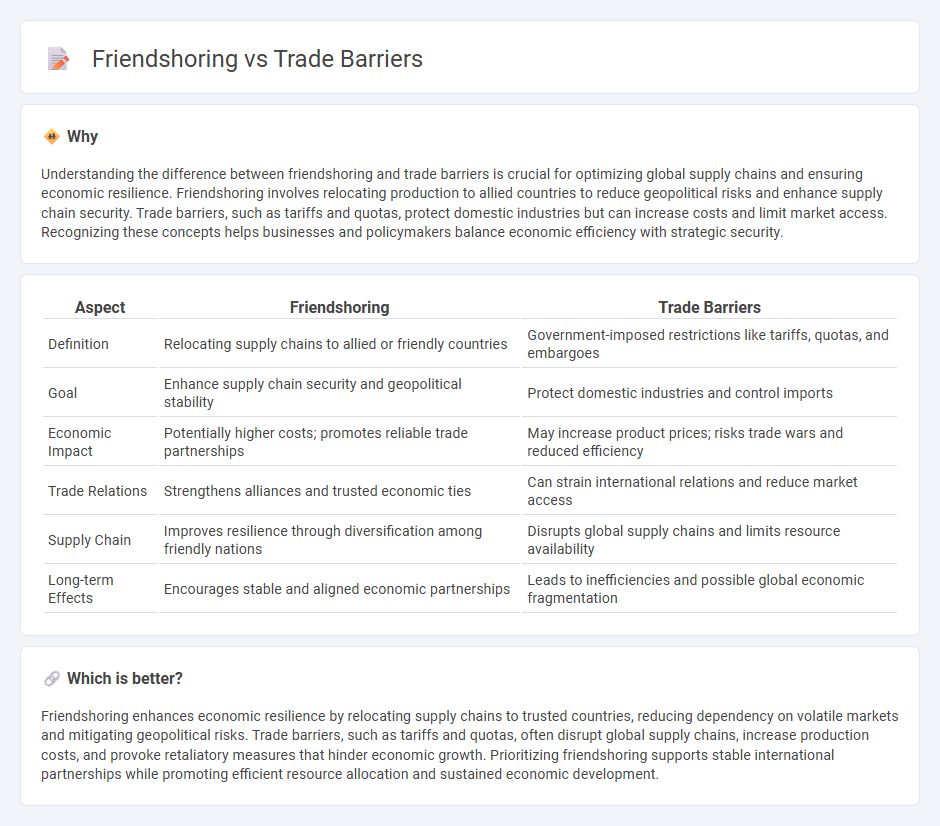
Friendshoring enhances economic stability by relocating supply chains to allied nations, reducing dependence on politically unstable regions. Trade barriers, such as tariffs and quotas, disrupt global commerce, increase costs, and limit market access for businesses. Explore how friendshoring and trade barriers shape international trade and economic resilience.
Why it is important
Understanding the difference between friendshoring and trade barriers is crucial for optimizing global supply chains and ensuring economic resilience. Friendshoring involves relocating production to allied countries to reduce geopolitical risks and enhance supply chain security. Trade barriers, such as tariffs and quotas, protect domestic industries but can increase costs and limit market access. Recognizing these concepts helps businesses and policymakers balance economic efficiency with strategic security.
Comparison Table
| Aspect | Friendshoring | Trade Barriers |
|---|---|---|
| Definition | Relocating supply chains to allied or friendly countries | Government-imposed restrictions like tariffs, quotas, and embargoes |
| Goal | Enhance supply chain security and geopolitical stability | Protect domestic industries and control imports |
| Economic Impact | Potentially higher costs; promotes reliable trade partnerships | May increase product prices; risks trade wars and reduced efficiency |
| Trade Relations | Strengthens alliances and trusted economic ties | Can strain international relations and reduce market access |
| Supply Chain | Improves resilience through diversification among friendly nations | Disrupts global supply chains and limits resource availability |
| Long-term Effects | Encourages stable and aligned economic partnerships | Leads to inefficiencies and possible global economic fragmentation |
Which is better?
Friendshoring enhances economic resilience by relocating supply chains to trusted countries, reducing dependency on volatile markets and mitigating geopolitical risks. Trade barriers, such as tariffs and quotas, often disrupt global supply chains, increase production costs, and provoke retaliatory measures that hinder economic growth. Prioritizing friendshoring supports stable international partnerships while promoting efficient resource allocation and sustained economic development.
Connection
Friendshoring reshapes global supply chains by relocating production to allied countries, reducing dependence on politically unstable regions. Trade barriers, such as tariffs and quotas, influence this shift by making trade with non-allied countries more costly and complex. Together, friendshoring and trade barriers redefine international trade dynamics, emphasizing security and reliability over traditional cost efficiency.
Key Terms
Tariffs
Tariffs remain a primary trade barrier, imposing taxes on imported goods that increase costs and limit market access. Friendshoring, the strategy of sourcing from politically aligned countries, aims to reduce tariff risks by fostering closer economic ties and supply chain security. Explore how friendshoring can reshape tariff implications and international trade dynamics.
Supply chains
Trade barriers such as tariffs, quotas, and export restrictions disrupt global supply chains by increasing costs and limiting access to raw materials and markets. Friendshoring, the strategy of relocating production to allied or friendly countries, aims to enhance supply chain resilience by reducing geopolitical risks and ensuring stable supply flows. Explore how friendshoring reshapes supply chain strategies in response to evolving trade barriers.
Geopolitics
Trade barriers, such as tariffs and import quotas, disrupt global supply chains by increasing costs and restricting market access, intensifying geopolitical tensions among major economies. Friendshoring redirects supply chains to politically allied countries to enhance security and reduce dependency on potentially adversarial nations, reshaping international trade dynamics. Discover how these strategies influence global economic stability and sovereign power projections.
Source and External Links
Barriers to Trade - Econlib - The most common trade barriers are tariffs (taxes on imports), embargoes (blockades limiting trade), and government subsidies that make domestic goods cheaper than foreign products.
FOREIGN TRADE BARRIERS - USTR - Trade barriers include technical regulations, sanitary and phytosanitary measures, government procurement restrictions, weak intellectual property protection, services and digital trade restrictions, and limits on foreign investment.
Trade Barriers - Definition, Importance, Types, Effects - Trade barriers are government-imposed measures like tariffs and taxes that restrict imports, often to protect domestic industries or pursue political goals, and can lead to higher prices and less choice for consumers.
 dowidth.com
dowidth.com